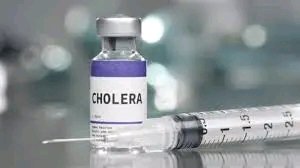Katsina records 118 suspected cholera cases, zero-cases in Kaduna, Kano
As Nigeria grapples with a surging cholera outbreak, available data from the Nigeria Centre for Disease Control (NCDC) showed that no fewer than 31 states have so far recorded 528 confirmed cases.
Out of these cases, 53 deaths have been recorded in no fewer than 117 local governments across the country.
However, the three tiers of government and their partners have been employing proactive measures to tame the outbreak and prevent it from spreading.
President Bola Tinubu had since approved the establishment of a multi-sectoral cabinet committee on the control of the epidemic headed by the Coordinating Minister of Health and Social Welfare, Prof. Ali Pate.
In Katsina, the state government said it has recorded 118 suspected cholera cases out of which two were confirmed, disclosing that it was putting in place proactive measures to curtail the possible outbreak of the disease.
The Director of Epidemiology, state Primary Healthcare Development Agency, Dr Kabir Suleiman, stated this to the News Agency of Nigeria (NAN) in Katsina.
Suleiman explained that cholera was an ailment caused by bacteria, which was detected with acute diarrhea.
“Based on our records, around March, this year, we had an outbreak of cholera in Kusada local government. There were 68 suspected cases where we have two confirmed cases with one death.
“The situation was effectively managed by the government together with the development partners,” he said.
Suleiman added that recently, about 118 suspected cholera samples were taken for laboratory tests.
According to him, all the cases were negative, adding, “So, for now, we don’t have new cholera cases. But the state is fully prepared for any emergency.
“Basically, we can coordinate any outbreak that can affect the state at any point in time.”
The director said the state, together with some of the development partners, have the required equipment to fight against the disease.
“We have all the needed equipment to treat such outbreaks. We have maintained our system at alert, where we are now at alert mode.
“Rapid Response Teams, including surveillance and notifications officers have already been trained on proper detection and management of such diseases.
“In terms of prevention and control, we are taking measures to curtail the spread of the disease to other places in the state,” Suleiman said
He further said that the agency has produced jingles to sensitise the residents on the causes of the disease, treatment and preventative measures.
The director further revealed that the government engaged about 3, 000 ‘Volunteer Community Mobilizers (VCMs)’ who visit house-to-house to sensitise women on the importance of maintaining personal hygiene.
Suleiman also said that the government had established ‘Oral Rehydration Points’ at the 34 Comprehensive Health Centres (CHCs) for admission and treatment of cholera cases.
“We also have a normal routine surveillance system that is working throughout the day in order to effectively fight against outbreak of emergencies like cholera,” he said.
Suleiman added that the government was also building 102 Primary Healthcare Centres (PHCs) in the state to enhance healthcare services at the rural areas across the state.
He. therefore,urged the people in the state to continue to imbibe the habit of personal hygiene and environmental sanitation, as part of the plausible measures to avert diseases’ outbreak.
Meanwhile, in Kaduna, the State Primary Health Care Board (SPHCB) said that there was no any reported case of cholera in the state in spite of it being recorded in neighboring states.
The Incident Manager (IM) of the board, Dr Abdullahi Musa, said this in an interview with the News Agency of Nigeria (NAN) in Kaduna.
Musa, who doubles as the board’s ‘Disease Surveillance and Notification Officer (DSNO),’ therefore said the state was alert and prepared in the advent of any emergency to curtail it in a short time.
He disclosed that the state had reactivated its rapid response team which consists of a team of experts that were competent and capable of responding to any form of outbreak or public health emergency.
Musa also said they were able to identify some of designated health facilities at the local government levels that would serve as treatment centres in case of the outbreak of cholera in the state.
He equally said they have identified some selected facilities that can diagnose the case of cholera, adding, “This are facilities that have laboratories for diagnosing cases of cholera.”
Speaking on the area of surveillance, the DSNO said they were able to sensitise many personnel on how to identify cases of cholera.
Stressing the importance of surveillance, Musa said they have Surveillance Officers, the DSNO’s at the LG level, other Surveillance Officers at facilities level and community informants.
“We were able to sensitise them so they could be informed on the current outbreak of cholera in some states, and should be able to pick up cases on time before it spread, when it eventually comes to the state,”he said.
Speaking on area of media engagement, Musa said they were airing jingles and having programmes in order to sensitise the public about the outbreak of cholera in the country and various ways it could be contacted, its signs and symptoms and prevention.
He added that the government was also supporting them in areas of water purification by procuring chlorine to chlorinate sources of water.
Musa added, “Currently, we have marked all the waves in the state. Over 260,000 waves were marked out and about to start chlorination so as to purify sources of water for the public.”
He urged the public to take any suspected case to the hospital, restating the state’s readiness to respond to the cholera outbreak without spreading it to other places in the advent of an emergency.
Also in Kano State, the state government said it has not recorded any case of cholera.
The News Agency of Nigeria (NAN) reports that the Nigeria Centre for Disease Control and Prevention (NCDC) had earlier listed Kano among the states battling the disease.
The Commissioner for Health, Dr Abubakar Labaran, said this while fielding questions from newsmen in Kano.
Labaran, however, said that findings so far revealed that there was no cholera outbreak in the state.
“We don’t have a single case as of now. We have seen some reports in the media but we can categorically tell you that there is none,” he said.
The commissioner explained that the state government had unveiled proactive measures to safeguard the people against the cholera outbreak in the state.
Labaran said, “As a government, we have taken necessary measures, including alerting our Emergency Preparedness Response (EPR) committee two weeks ago when the disease broke out in Lagos.
“The committee, comprising health practitioners, surveillance and notification officers, health educators, and ward volunteers, is tasked with reporting any strange disease or pandemic and taking prompt measures to halt its spread.
“The state has launched a sensitisation campaign to educate people, particularly in rural areas, on how to protect themselves.
“We have launched public campaigns to raise awareness and promote proactive measures within communities, focusing on personal and environmental hygiene, and avoiding the consumption of unsafe water.”
He further said that the state government had procured drugs to combat the disease in the event of an outbreak.
The commissioner also urged the communities to promptly report any malfunctioning public water facilities to the nearest officials for immediate repairs, ensuring access to clean water throughout the state.
Similarly, the Director-General, Kano State Centre for Disease Control (KNCDC), Prof. Muhammad Abbas, has called on the people in the state to take cholera with the seriousness it deserves due to its fatal consequences in the society.
Abbas strongly advised the residents to take proactive measures to set the state free from the dreaded disease.
The director-general explained that the commonest identified symptoms of cholera were diarrhea, vomiting and rapid dehydration, advising, ”whoever is spotted with any or all of the symptoms should be rushed to the nearest health facility.
”The people must take timely actions to avert cholera outbreak in the state through frequent washing of hands with soap and water, drinking safe water and avoiding contaminated sources of water including rainwater.”
The rest, said he, include avoiding close contact with the people showing symptoms of cholera, storing food appropriately and washing hands before and after using toilets.
Abbas further emphasized that the people should develop the habit of staying safe with good hygiene as additional protection against cholera through use of proper toilets and hygienic disposal of wastes.
According to him, all foods should be thoroughly cooked and safely stored, raw and cooked seafood should be avoided while fruits and vegetables must be adequately washed with clean water before use.
The director-general also assured the people of the state that the agency was up and doing, through the fullest support of the ministry, to focus on any public disease that may cause havoc to their socio-economic well-being. (NAN)





